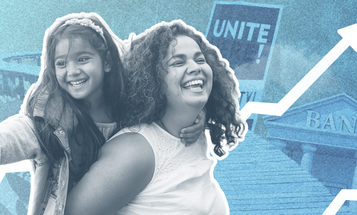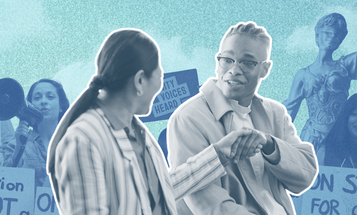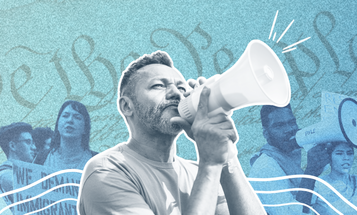
The Legacy of Juneteenth, Building Power in the Midst of Justice Delayed
Juneteenth isn't just about celebrating freedom — it's a reminder of the moral consequences of power-hoarding systems and what communities can do for themselves.

On June 19, 1865, more than two years after the Emancipation Proclamation was signed, Black people in Galveston, Texas, were finally informed that they were free. This day, which we celebrate as Juneteenth, marks the moment Union troops enforced the end of slavery in Texas, a delayed but critical step in the struggle for Black freedom.
The delay in delivering freedom to Black Texans was not a consequence of news taking time to travel because of geographical distance. It was a consequence of systems built to hoard power and deny economic opportunity. For two and a half years after the signing of the Emancipation Proclamation, Texas enslavers chose to withhold the news from enslaved Black people, while enslavers from neighboring states migrated west to escape enforcement from the Union army. Even after Union troops arrived in Galveston, enslavers continued to deny Black people freedom until government agents forced their hands. Galveston city officials openly disregarded the order by forcing formerly enslaved people back to work, and Black people who pursued their freedom were often lynched or endured violence.
Even under the weight of slavery and threat of violence, people gathered, organized, resisted, and prepared.
Juneteenth is more than a historical milestone; it is a lens through which we understand that when justice is denied and delayed, Black communities cannot and do not wait to build enduring power. Even under the weight of slavery and threat of violence, people gathered, organized, resisted, and prepared. In Texas, they built churches, established schools, developed cultural and community practices, and supported one another through mutual aid. In short, they built their own systems. And when legal freedom finally came, they had already begun laying the foundation for liberation. During Reconstruction, Black Texans founded funeral homes, grocery stores, small farms, and other small businesses to help build independent communities and economies. At one point, over 40 Black freedmen served in the Texas legislature. Earlier organizing during slavery, like mutual aid networks to cover burial costs and church leadership, meant they could mobilize quickly to assert their independence.
Today, those same foundations of community, cooperation, and collective action are essential tools in the fight for economic security and mobility. The same structures of capitalism and white supremacy that once upheld slavery now show up in modern forms: widening wealth divides, union-busting, underfunded public services, and predatory financial practices.
Power and today’s economy
Economic security and economic mobility are both essential to thriving communities, and both are out of reach for far too many Black families.
Last year, Dēmos launched the Power Scorecard, a data tool designed to assess economic, civic, and political conditions across all 50 states. The findings are sobering: Not a single state reached even half the optimal score. Texas scored just 15 of the optimal 60 for economic conditions, placing it in the bottom 40 percent nationwide. Economic conditions refer to an individual or communities’ financial well-being and include indicators that measure access to livable wages, affordable housing, public education, and more. Additionally, they tell us where power is concentrated and where it’s being denied.
We see the evidence in the field daily:
- Companies and conservative politicians are weakening labor protections and exploiting their workers.
- Billionaires and large corporations continue to accumulate wealth through tax breaks and subsidies, while public goods that promote racial and economic equity are underfunded.
- Predatory lenders and tech platforms target Black communities with exploitative financial products that extract wealth rather than build it.
Building while we wait—what we do now
Just as Black Texans built community institutions before freedom was fully recognized, today’s movement leaders are not waiting for permission to transform our economic future.
Just as Black Texans built community institutions before freedom was fully recognized, today’s movement leaders are not waiting for permission to transform our economic future. At Dēmos, we are committed to building people power as the foundation of change. Our Power Agenda outlines how to shift power back into the hands of communities through various strategies, including these:
- Workplace justice: Supporting worker-led campaigns that demand just wages, dignity on the job, and rebalancing power in the workplace.
- Tax justice: Fighting for public investment in historically redlined communities and for progressive taxation on concentrated wealth, not more tax breaks for the rich.
- Financial justice: Calling out predatory lenders, defending consumer protections, and advocating for local financial tools, like public banks, that prioritize care over profit.
Juneteenth isn’t just a celebration of freedom realized; it’s a call to transform the systems that still seek to deny it.
Juneteenth isn’t just a celebration of freedom realized; it’s a call to transform the systems that still seek to deny it. Oppression doesn’t end politely. It ends because people organize, communities demand more, and we amass enough power to replace oppression with liberation.
We honor Juneteenth not just by remembering the delay but by recognizing the organizing and power-building that made freedom possible and carrying forward that fight. In every push for policy that affirms Black lives and futures, we carry forward the spirit of Juneteenth: enduring resistance, strategic power-building, and an unwavering demand for freedom.




